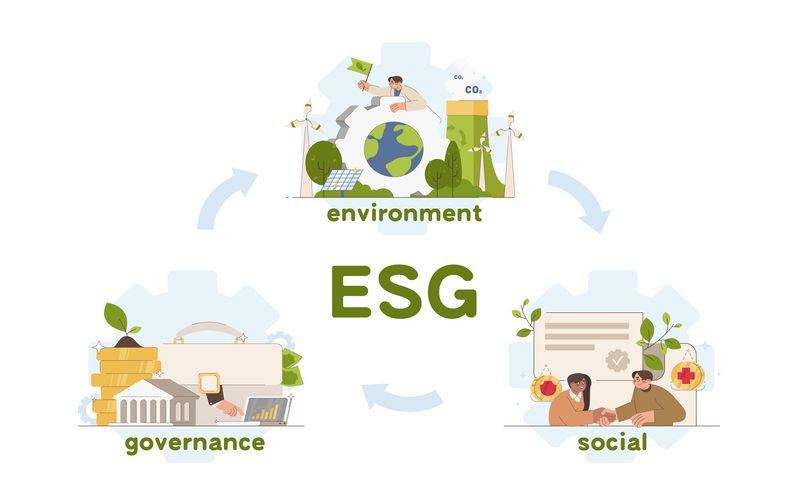You’ve probably heard about sustainable investing and how younger generations want to put their money where their values are. But what exactly does ESG investing mean and how can you incorporate environmental, social, and governance factors into your own investment decisions? The truth is, it’s easier than you might think. ESG investing is going mainstream, and there are lots of opportunities these days to build a portfolio that makes a positive impact.
Understanding Sustainable Finance: Defining ESG Criteria

To understand sustainable finance, you need to get familiar with environmental, social and governance (ESG) criteria. ESG refers to three central factors in measuring the sustainability and ethical impact of an investment.
Environmental criteria look at how a company performs as a steward of the natural environment. Things like pollution, waste, resource depletion, and climate change are considered. Are they reducing their carbon footprint and environmental impact?
Social criteria examine how a company manages relationships with employees, suppliers, customers, and the communities in which they operate. Issues around diversity and inclusion, health and safety, and human rights are evaluated. Do they treat people and society with fairness and respect?
Governance deals with a company’s leadership, executive pay, audits, internal controls, and shareholder rights. Is the company accountable and transparent in how it operates?
By analysing ESG factors, investors can identify risks, uncover opportunities, and direct capital to more sustainable and impactful companies. Considering E, S and G helps ensure your money is supporting ethical businesses making a positive difference.
Integrating ESG into investment choices means your financial decisions can reflect your values. It may even lead to better long-term returns. A win-win for your wallet and the world.
Applying ESG Frameworks: Analysing Environmental, Social, and Governance Factors

To effectively analyse ESG factors, you need to apply the right frameworks. Two of the most common are the UN Sustainable Development Goals (SDGs) and the Global Reporting Initiative (GRI) standards.
The 17 SDGs set targets for addressing global challenges like poverty, inequality, and climate change by 2030. As an investor, you can evaluate how companies align with and contribute to specific SDGs. For example, companies focused on renewable energy, sustainable agriculture, and affordable housing may align well with SDGs 7, 2 and 11 respectively.
The GRI standards provide guidance on how companies can report on ESG topics that matter to investors and stakeholders. Using these standards, you can assess the depth and quality of a company’s ESG disclosures to determine how transparent they are about their impacts. Look for companies that comprehensively disclose on relevant topics, like environmental compliance, labour practices, and product responsibility.
Once you’ve analysed companies through these frameworks, you’ll have a better sense of their ESG risks and opportunities. You may find some are leaders, actively innovating sustainable solutions, while others are laggards struggling to meet basic standards. As an investor, the choice is clear – put your money towards the leaders shaping our sustainable future. After all, that’s what integrating ESG is all about.
Integrating ESG Into Decision-Making: Investment Opportunities and Case Studies

Once you understand the importance of ESG factors and current trends in sustainable finance, it’s time to apply this knowledge to your investment decisions. There are many opportunities to invest in companies making a positive impact.
Green Bonds
Green bonds are fixed-income securities issued by governments, corporations and other entities to finance environmental and climate-focused projects. The proceeds are earmarked for eco-friendly initiatives like renewable energy, pollution prevention, and biodiversity conservation. Investing in green bonds allows you to support sustainability while still earning interest.
Impact Investing
Impact investing means putting money into companies, organisations, and funds with the intention of generating a measurable social or environmental impact along with a financial return. This could include investments in renewable energy, healthcare, education, microfinance, and more. Impact investments come in many forms, from stocks and bonds to private equity funds and crowdfunding.
ESG ETFs and Mutual Funds
For broad market exposure with an ESG tilt, consider sustainable exchange-traded funds (ETFs) and mutual funds. These products invest in companies that score well on ESG metrics. Some track major indexes like the MSCI ACWI ESG Leaders Index or S&P 500 ESG Index. Others focus on specific themes like clean energy or gender diversity. ESG funds allow you to align your investments with your values without having to pick individual stocks.
Case Study: Tesla
Tesla is accelerating the world’s transition to sustainable energy. While its electric vehicles are the most well-known product, Tesla also produces solar panels and energy storage systems for homes and utilities. The company has pushed the entire auto industry to pursue electrification and invest in renewable energy. If you believe in Tesla’s mission and growth potential, its stock could be an attractive ESG investment opportunity.
Integrating ESG factors into your investment decisions is a powerful way to drive change. By supporting sustainable companies and projects, you can help build a greener future while achieving your financial goals.
Conclusion
That covers the basics of getting started with ESG investing. Now it’s up to you to dig into the details for the companies and funds you’re interested in. Do some research on their environmental and social impact, check how they score on various ESG rating scales, and make sure their priorities align with your values. It may take a little extra work, but investing in line with your principles can be hugely rewarding. You’ll be putting your money where your mouth is and helping shape a more sustainable future for us all. Not a bad way to build wealth and make a difference at the same time. Join our course to learn more!

